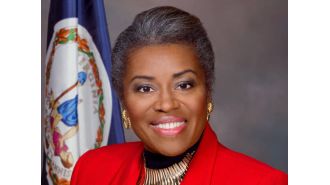At Hearing on Financial Aid Scandal, Lawmakers Grill Officials and Look to Close a Loophole
Illinois politicians considered denying admission to students whose families exploited the guardianship law to qualify for aid they wouldn’t otherwise receive, saying it was an “injustice.”

Saying they need to “get to the bottom of this injustice,” Illinois lawmakers grilled university and state financial aid officials Thursday about how to prevent families from exploiting guardianship laws to obtain need-based college financial aid they wouldn’t otherwise receive.
At a packed hearing in Chicago, more than a dozen members of the Illinois House discussed possible reforms, from tweaking state laws and educating judges who sign off on questionable guardianship changes to denying college admission to students whose families have exploited legal loopholes for financial gain.
“Need-based financial aid programs are a zero-sum game. When a student who does not qualify for the aid manipulates the system and is awarded money, there are students who are qualified for the aid who don’t receive it … and consequently they lose out on college altogether,” said state Rep. Carol Ammons, a Democrat from Champaign. “However, the rising costs of college should not be overlooked in this case. A system that drives families to cheat is a broken system.”
Yet lawmakers appeared unsure what they could do to stop the practice, even as they tried to pin down whether any laws were broken. “You’re not alarmed or think they committed an illegal act?” Rep. La Shawn K. Ford, a Chicago Democrat, asked one state financial aid official. “So we’re here only because we want to fix the moral compass of people?”
The hearing before two House higher education committees was called after a ProPublica Illinois investigation last week exposed how nearly four dozen families from the northern Chicago suburbs in Lake County went to court to give up legal guardianship of their children, sometimes a few months before they turned 18, to relatives or friends. Reporters subsequently identified an additional 10 cases in McHenry County and two in Cook County.
By having someone other than their parents be their legal guardian, students can declare themselves financially independent so their parents’ earnings and assets aren’t taken into account when applying for need-based federal, state and university grants. They can also qualify for subsidized federal student loans. The Wall Street Journal also reported on this issue.
Officials from the University of Illinois at Urbana-Champaign first flagged the questionable guardianship changes last summer and alerted federal authorities. University officials said they can decline to give institutional funds to these students but are obligated to award state and federal need-based grants.
At Thursday’s hearing, university officials implored lawmakers to give them the authority to reduce or block state need-based grants from the Monetary Award Program, known as MAP, in cases where students obtained independent status because of questionable guardianship transfers. MAP grants are worth $300 to $5,300 a year.
“That level of authority and flexibility would give us a much stronger set of tools to immediately and effectively address instances like the ones that we are discussing today,” said Michelle Trame, the University of Illinois director of student financial aid.
Trame urged lawmakers to enact safeguards soon since financial aid for the coming school year will be distributed before the end of August.
Ford, who chairs the House higher education appropriations committee, told reporters after the hearing he was not convinced that giving universities discretion to reduce MAP grants was the solution. Instead, he said the focus should be on educating judges and examining the guardianship law itself.
“It’s not illegal. We can make it illegal,” he said.
Ford and other lawmakers cautioned that they want to protect children in legitimate guardianships and avoid making the financial aid process unnecessarily burdensome for them.
Several lawmakers highlighted the need to hear from judges in future hearings. “We have no one here today from the judiciary, is that right? I’m a little bit concerned we may be getting ahead of our skis,” said Rep. Terri Bryant, a Republican from Mt. Vernon in southern Illinois. “It appears to me that this is a problem with the judiciary granting guardianship rather than what the schools are going to do about it.”
The Illinois Probate Act, the law that governs guardianship, does not specify circumstances in which guardianship should be denied. According to the law, a court can appoint a guardian if the parents consent, the minor agrees and the court determines it is in the child’s best interest.
ProPublica Illinois found that one judge in Lake County, Donna-Jo Vorderstrasse, approved dozens of guardianship changes brought to her court since January 2018 on behalf of college-bound students. Vorderstrasse, who has since moved to another division, declined to comment and referred questions to the court’s executive director, who did not return a call.
This year, however, another Lake County judge, Joseph Salvi, took over hearing guardianship cases and last month denied the guardianship petition of a 17-year-old who lived with his parents in suburban Long Grove.
Four days after Salvi denied the petition, the same family filed a new petition in McHenry County. The case was supposed to be heard Monday, but the family didn’t show up.
Eric Zarnikow, executive director of the Illinois Student Assistance Commission, which administers the MAP grant, told lawmakers his agency plans to reach out to judges to educate them about the potential abuse of guardianship.
Zarnikow also said it appears that the scheme came to light before it became widespread.
“The good news is this appears to have been caught early,” he said. “If this works in Illinois, it likely works in other states.”
Rep. Dan Brady, a Republican from Bloomington-Normal in Central Illinois, said he thought the law may need “some fine-tuning.”
Noticeably absent from the hearing were families involved in the questionable guardianships and attorneys who filed the cases. In an interview after the hearing, Ford said lawmakers asked the universities to notify families of the hearing, but “nobody wanted to come.” Parents still may be subpoenaed to appear at future hearings, he said. Ammons also said after the hearing she thought it was appropriate for the state’s attorney general’s office, which is investigating the abuse of guardianships, to finish its work before families are called to testify.
“We don’t know yet what the AG is thinking,” Ammons said. “Is this considered theft?”
An attorney for some of the families, Mari Berlin, of the Kabbe Law Group, has said families who took part in the guardianship changes said they make too much money to qualify for financial aid but struggled to pay for college.
Lawmakers repeatedly asked for more information about the students who have enrolled at the University of Illinois at Urbana-Champaign, including their high schools and how much money they received in need-based grants. University officials declined to provide that information, citing privacy laws.
Rep. William Davis, a Democrat from East Hazel Crest, in the southern suburbs of Chicago, asked university officials whether they could deny admission to applicants who misrepresented their true financial status. Andy Borst, director of undergraduate admissions at the university, said the issue wasn’t clear-cut.
“I feel like we were limited with the judges in the state saying, ‘Yes, this was a legal transfer of guardianship,’” Borst said. “We have to abide by that.”
University officials also asked lawmakers to regulate college consultants. Several of the families identified by ProPublica Illinois hired the same firm, Destination College, which boasts on its website of “strategies to lower tuition expenses.” The company’s owner, Lora Georgieva, has declined to comment to ProPublica Illinois but said elsewhere she did nothing wrong and was merely pointing families to a legally available option.
The reporting last week from ProPublica Illinois drew national attention and spurred the U.S. Department of Education’s Office of Inspector General to call for reforms. That office, which called the tactic “student aid fraud,” has recommended adding language on federal financial aid forms to clarify that students involved in this kind of guardianship no longer qualify for aid if they continue to receive medical and financial support from their parents.
In addition, other universities across Illinois and in other states have begun examining their own records to see if students in questionable guardianships had obtained financial aid to which they otherwise would not have been entitled.
At Thursday’s hearing, representatives from all of the state’s public university systems testified about the issues. None, apart from the University of Illinois at Urbana-Champaign, had identified any questionable guardianship cases. Illinois State University said it was still seeking further documentation from fewer than five students in guardianships.
Only one official from a private institution, Dominican University, testified at the hearing. Lawmakers said they hoped to hear from some of the most prestigious private universities in the state, including the University of Chicago, in future hearings.
In a recent interview, Loyola University Chicago’s associate director of financial aid, Kelsey Gerber, said her office began looking into questionable guardianships last year after learning of the practice from officials at DePaul University.
Loyola has since identified two applicants with a similar guardianship setup. When the university asked for additional documentation, Gerber said, the students didn’t respond and didn’t attend Loyola.
DePaul has seen a “small number” of these types of guardianship cases, a spokeswoman said in an email, adding that the university has been in touch with the U.S. Department of Education for guidance.






